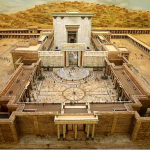Herod negotiated the complex relationship of the various Jewish groups, his Roman masters and the nations surrounding him with cunning, if not with ease. Herod’s cities and Temple complex attempted to bridge the gaps among these various groups, but there were simply too many moving parts and fissures appeared, especially among the rural Jews of… Read More »
Herod had seen the greatness of Rome. His sons were educated in Caesar’s household. His kingdom had a substantial, urban Gentile population which formed a substantial power block. Early in his reign, Herod even minted coins with Roman helmets on them, showing his reliance on (or at the very least, admiration of) the Roman system.… Read More »
Thanks to his partnership with Augustus Caesar, Herod became enormously wealthy. If Josephus is to believed, Herod’s wealth was truly staggering, and he put it to good use. In the broader world, he sponsored numerous buildings and improvements, and in one year even sponsored (and hosted) the Olympic Games at one of his new cities.… Read More »
Rome’s influence over the Levant began in 63 BCE when the general Pompey intervened in a feud between two factions of Hasmonean kingdom. Pompey took Jerusalem, installed one of the leaders, Hyrcanus as ethnarch and appointed one of his allies, Antipater of Idumea, as epitropos or “regent” to oversee affairs. Antipater saw the region through… Read More »
Worship cannot be generated through mood lighting or great musicians because the source of worship must be the understanding (in part, 1 Corinthians 13:12) of God’s glory in Jesus Christ. Worship is not of this world; it is an attribute of resurrection. Only those raised in Christ can truly worship.
I wouldn’t trade being the father of a little girl for anything in the world. My sister has five sons (ages 11-1), and I have a couple of friends with lots of boys. I wouldn’t mind having a boy as well, but Ariel is a tremendous joy. Her friend Paige comes over a couple times… Read More »



